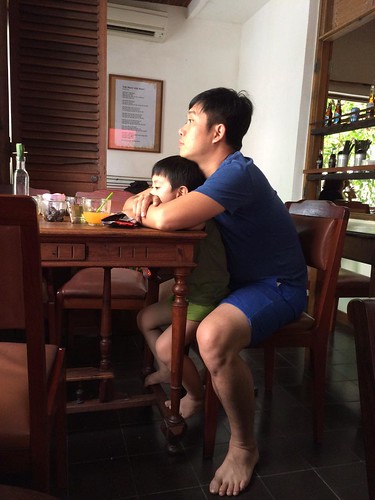Leaving Saigon
"sic vos non vobis"
“Leave Saigon, will you?”
He turned his back.
The girl in the violet áo dài, once a high schooler gliding through the old Legrand de la Liraye street, had once mesmerized the boy in a white Petrus Ký uniform. Day after day, he cycled there just to catch the fleeting glimpse of her flowing dress, vanishing like a mirage.
He chased that mirage.
The smile she left on her lips — who it was for, only she knew.
Teasing the wind.
Whose delicate hand held down the restless hem in the breeze, leaving her smile trailing behind like an unfinished thought?
Then one afternoon, that violet silhouette no longer drifted like an illusion. It stayed.
Sunlight poured over a path, two shadows intertwined under rustling leaves.
Back then, Saigon was drowning in flying leaflets.
Calls for resistance.
Calls for peace.
Waves of people chasing an ideal worth living for.
She — the violet áo dài — dreamed of a Hippocratic vow, carefully written in cursive on the first page of her notebook, as a tribute to a professor she admired, his name: Biểu Tâm — bold and proud.
Her Tú tài đệ tú exam was a mix of worry and thrill.
She shared those dreams beneath a canopy where seasons had passed, with the boy in white.
After hearing her dreams, he wrote faster.
He wrote thoughts of humanism, national identity, liberation, and went on to analyze Vietnam's place in the Greater East Asia Co-Prosperity Sphere.
His notebook filled with slogans disguised as essays.
Back then, Saigon was drowning in flying leaflets.
Calls for resistance.
Calls for peace.
Waves of people chasing an ideal worth living for.
They marched.
He, in his white shirt, was among the first.
He — absorbed in Logic, Ethics, Eastern Philosophy — read metaphysical concepts and personal antitheses to the Gia Long girl during golden dusks.
News kept coming. War was burning red.
One day, he said, “I’ll take up a rifle.”
Truth and lies.
Propaganda and hope.
Democracy and freedom.
That day, he fell silent — crafting banners with red cloth, chasing his own ideals.
Back then, Saigon was drowning in flying leaflets.
Calls for resistance.
Calls for peace.
They marched.
He was there — the white shirt.
And she — the violet áo dài — clutching a camera, capturing a moment that would become their shared history.
The most haunting photo was soaked in blood.
She wiped.
He spoke.
Rambling:
“Do you see? We lived in such a time.”
His white turned crimson.
Gunfire echoed with the cries of cicadas.
She rested her head on his arm that night, listening again to his theories on Ethics and Morality.
That night, she gave him all she had.
A drifting conversation left incomplete:
“Let’s leave Saigon, shall we?”
“Where to?”
“Anywhere. As long as it’s not here.”
“Petrus Ký once said sic vos non vobis... But what do we live for?”
He looked up.
The woman had vanished — the same woman who had disappeared from his life after that one night.
Thirty-eight years passed like a blink in Saigon’s sleepless night, gunfire blending with cicadas.
Before him now stood a woman in a sea-blue áo dài, eyes glistening, beneath the outstretched hand of the Virgin Mary statue — sunlight behind her.
Choked up.
Truth and lies.
Propaganda and hope.
Democracy and freedom.
His white shirt had faded after the war.
He no longer clung to Ethics or Morality books.
His values were washed away on a day the boat drifted across alien waters, only to awaken on an unfamiliar shore.
A land he never imagined would become home for half his life — filled with memories of yesterday.
Each dream still carried the scent of home — motherland calling across the ocean, among drifting corpses.
Faith and Ideals.
He still followed the news from home.
But no longer joined the rallies.
He disliked "associations" and “crowds.”
He buried himself in the past — in books and history — with two rooms full of dusty philosophy texts.
His children had grown. One of them, just like him, obsessed with ideas, once asked:
“Dad, what does sic vos non vobis mean?”
History & the past.
He booked a flight — back to Motherland.
He never expected to see her again.
Neither did she.
She smiled — sunlight crossed between them, while behind, people tugged each other in indifference.
They embraced.
Her shoulder wet.
“I never thought I’d see you again.”
“Let’s leave Saigon, will you?”
Saigon no longer has flying leaflets.
No more calls for resistance.
No more calls for peace.
And no one left searching for a life worth believing in.




Không có nhận xét nào:
Đăng nhận xét